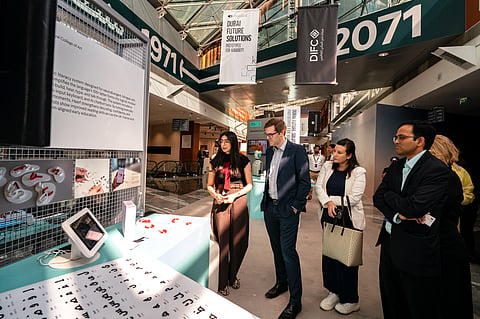Dubai Future Solutions - Prototypes for Humanity celebrates five winners with $100,000 prize
A new generation of creators is shaping tomorrow with practical, powerful solutions

Dubai: Five exceptional student innovators were honoured on November 18 during this year’s ‘Dubai Future Solutions – Prototypes for Humanity’ exhibition, where their projects were celebrated for offering practical solutions to some of the world’s biggest challenges. The awards were presented by Sheikha Latifa bint Mohammed bin Rashid Al Maktoum, Chairperson of Dubai Culture and Arts Authority, who praised the students for their creativity, drive and ability to turn complex problems into workable ideas.
The ceremony took place at AREA 2071 alongside the Dubai Future Forum, following a global search that drew thousands of submissions from more than 1,200 universities in 120 countries. From these, 100 projects were shortlisted and invited to Dubai and five stood out enough to receive this year’s top honours and a shared $100,000 (Dh367,250) prize to support their work.
The winning teams represented five key categories that reflect the programme’s mission to shape a better future through science and innovation:
Health Diagnosis and Therapies: CASPER – Precision therapy for drug-resistant infections
CASPER is a new way to fight dangerous infections that no longer respond to antibiotics. Instead of using drugs, it sends tiny programmed enzymes that work like “molecular scissors”, cutting and disabling only the harmful bacteria while protecting the good ones. It also comes with a simple test that changes colour to show which infection is present, helping doctors act quickly. This targeted approach could help treat infections in both people and animals more safely and effectively.
Circular Systems: SPEED – Fast tool for finding plastic-eating enzymes
SPEED is a new testing system that helps scientists quickly find enzymes that can break down different types of plastic. What used to take long, complicated lab work can now be done with a single, fast test using nanoparticles. This makes it easier to discover better enzymes, cuts research costs, and speeds up progress in biological recycling. It works across many plastics and supports advanced research, including AI-driven design.
Urban Society: Vocadian – Detecting worker fatigue through voice
Vocadian uses short voice recordings to predict when workers are too tired to perform dangerous jobs safely. By analysing small changes in speech patterns, along with sleep science and machine learning, it produces instant “fatigue scores” before shifts begin. Companies can then adjust schedules, prevent accidents and support worker wellbeing. Tested in large real-world trials, it offers a simple, non-intrusive and low-cost way to boost safety in high-risk industries like construction and transport.
Energy Futures: Iron Lights Lives – Long-lasting iron batteries for clean energy
This project introduces an affordable iron-air battery that can store renewable energy for up to 100 hours, far longer than typical lithium-ion batteries. Made from low-cost, widely available iron that doesn’t need complex processing, the system is safe, non-toxic and easy to scale. It can power anything from small rural communities to buildings in large cities, helping reduce reliance on fossil fuels and making clean energy more accessible, especially in underserved regions.
Life Resources: PlumeSense AI – Monitoring CO₂ storage in real time
PlumeSense AI helps track how captured CO₂ moves underground, something that normally requires slow and expensive computer simulations. By using a fast AI model trained on real data, it can predict CO₂ movement in milliseconds with high accuracy. This makes it easier to detect leaks quickly, reduce monitoring costs and build trust in carbon-storage projects. It offers a safer, more efficient way to support climate-change solutions that rely on storing CO₂ securely underground.
Sheikha Latifa highlighted how these projects show the strength of young talent and the importance of supporting ideas that can create real change. “We celebrate a distinguished group of creators who believed in their ability to make a difference,” she said. “True investment lies in minds capable of sustaining development and supporting community prosperity.”
The programme, delivered in partnership with Dubai Future Foundation, Art Dubai Group, the Hussain Sajwani DAMAC Foundation and DIFC, aims to help student-led innovations grow into real-world applications. Over the four-day exhibition, participants gain access to government leaders, industry experts, investors and partners who can take their ideas to the next stage.
This year’s winners demonstrate exactly why the initiative matters: young thinkers, global collaboration, and solutions ready to shape a better, more sustainable future.






